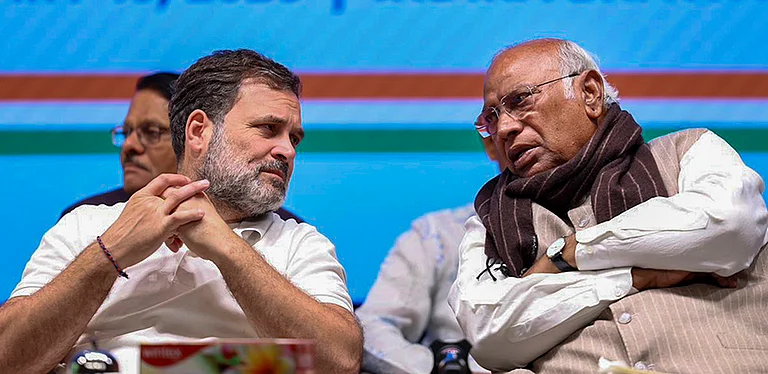The Supreme Court on Friday asked the Bihar government to specify the schedule for construction of infrastructure for special courts which would deal with cases under the Bihar Prohibition and Excise Act.
A bench of Justices S K Kaul and A S Oka was informed that 74 special courts have been set up by the state in 2019 and the Patna High Court has approved the map of construction of buildings for special courts through a letter of September 27 last year.
The apex court is hearing a matter relating to the prohibition law that had come into force in Bihar in 2016.
Advocate Gaurav Agrawal, who is assisting the top court as an amicus curiae in the matter, flagged another issue and said under section 37 of the Act, which deals with penalty for consumption of liquor, an executive magistrate can be empowered to exercise powers of judicial magistrate to conduct trials in "consumption cases".
Agrawal, in his note for hearing filed in the top court, said the state government had requested the high court in April this year for conferring powers of the judicial magistrate on the district collectors of the 38 districts but the high court had not accepted the proposal.
The note said the additional chief secretary of Bihar had written a letter on June 13, 2022 to the registrar general of the high court for conferring power of special courts on judicial magistrate regarding alcohol consumption cases.
"The Patna High Court has written a letter to the government on August 30, 2022 that the proposal of government to designate judicial magistrate to try the offences is in conflict with section 37 of the Act which empowers the executive magistrates to try the cases and has requested for appropriate amendment in the Act," it said.
It said later in September this year, the state government again wrote a letter to the registrar general of the high court that cases under section 37 may be looked into by the judicial magistrate and the matter is being considered by the high court.
The amicus said the state may be directed to indicate its plan of action regarding construction of infrastructure for special courts in each of the district.
"The counsel for state of Bihar to obtain instructions to specify the schedule for construction of the special courts," the bench said.
In his note, the amicus said if judicial magistrates have to be designated as special courts, then perhaps there would be a requirement of creation of additional posts of judicial magistrates, staffs and court rooms.
The state's counsel sought some time to respond to these issues and the bench posted the matter for hearing on January 23.
The note said the apex court in its order passed in August this year had noticed that in the last six years, 3,78,186 criminal cases have been registered under the 2016 Act but only 4,116 cases have been disposed of.
It said the state had amended section 37 of the Act on April 1, 2022 and now, the consumption cases can be disposed of by imposing fine/penalty.
The note, filed on Thursday, said the state has indicated that in April and May this year, 6,863 persons were let off on penalty.
"This court has also noticed difference of opinion between the Government of Bihar and the Patna High Court as regards conferring powers of judicial magistrate on the executive magistrate under section 37(2) of the Act. Therefore, this is the second issue which needs to be considered," the note said.
Regarding creation of judicial infrastructure and appointment of judicial officers, the note said the high court has indicated that total 140 vacancies, including 74 for the special courts, were advertised, out of which 106 posts were filled in October last year.
It said fresh vacancies have been advertised and the recruitment process is on and likely to be completed in two-three months.
"Seventy-four special courts are functional in the state,” the note said, adding that the state has mentioned that 666 posts of support staff have been sanctioned.
It said the high court has indicated that vacancies for the posts for support staff in civil courts in Bihar have been advertised by the convenor, centralised selection and appointment committee cum district and sessions judge, Patna, and the convenor has said that the ongoing recruitment process will tentatively be completed by August 2023 end.
The amicus has suggested that if a person, especially a young individual, is apprehended for alleged offence under section 37 of the Act, that is only for consumption, and is lodged in a jail along with others who are accused of far serious offences, it would have adverse effect on that person.
"The state government may consider whether there is a need for a separate incarceration facility for individuals who are accused under section 37 of the Act so that they do not end up graduating to more serious crimes,” he said.
The apex court had earlier flagged the issue regarding the number of cases arising out of the 2016 law clogging the judicial system.
-With PTI Input


























